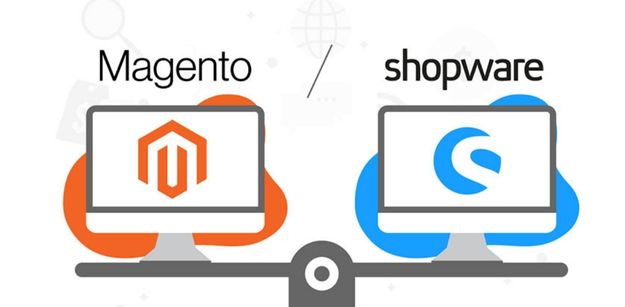The shift from traditional brick-and-mortar stores to digital eCommerce stores is clearly evident today. We often see ourselves and others around us order various items like groceries, clothing, books, electronics, and other everyday items from online stores.
To build such online stores, there’s no dearth of shopping platforms today. We have Magento, Shopware, WooCommerce, Wix, BigCommerce, and many more. However, today’s post will limit to the comparison of two leading eCommerce competitors – Magento 2 and Shopware.

Here, let’s give you a complete analysis and comparison of the two platforms before you hire dedicated Magento 2 developers or Shopware experts.
Shopware & Magento 2 – In a Glimpse
| Shopware | Magento 2 | |
|---|---|---|
| Release Date | 2000 | November 17, 2015 |
| Number of websites | 38,351 live websites | 93,986 live websites |
| Popularity | Third most popular in Austria, Germany, and Switzerland. | Popular worldwide, with market share of 0.72% in 4th most used eCommerce site. |
| Description | Shopware is the most famous eCommerce platform in the German-speaking community. The software became entirely open-source in 2016 and provides a modern and optimized eCommerce development approach to businesses. | Magento 2 is a PHP-based eCommerce platform with over 250k active users. It has numerous plugins and templates for use so that Magento programmers can build robust eCommerce stores. |
Magento 2 Vs Shopware: Head-to-Head Comparison
Based on Pricing
While pricing alone could not determine how viable a particular software is, it is still a crucial factor for many business units. One has to know whether the pricing plans offered by the software are in line with the value or capabilities it offers or not.
Shopware Pricing
Since 2016, Shopware became an open-source eCommerce platform ready to develop, design, and manage online stores for businesses. It comes in three editions, namely –
I. Shopware Cloud/ Starter edition
Alternatively known as Community edition, this lets anyone build Shopware stores completely free of cost. Here, the store needs to be hosted on your separate server. As understandable, it comes with limited features and can be used by simple businesses selling limited products.
Developers can use the community features or extend them via plugins, customer & product streams, etc. Businesses can pay only when they start selling their products on Shopware.
II. Professional edition
Cost – €199.00/ month (or, €2,495.0 yearly).
This mid-range Shopware edition includes all the features from the community edition along with exclusive features like CMS extension, social shopping, customization, multi-language & multi-currency support, etc. Users also have the flexibility to select between self-hosting or hosting.
III. Enterprise edition
The Shopware enterprise edition is available to businesses on request. It is optimal for large-scale and successful businesses as they get to explore many advanced features like mapping B2B and B2C processes together in a system. This Shopware edition can meet the demanding requirements of an eCommerce store while ensuring scalability, security, and performance.
Magento 2 Pricing
Here also, we have three editions to look into.
I. Open-source Magento
The open-source type is practically free as you don’t have to pay a penny to install and use the Magento software. However, you have to arrange for hosting, security, and domain by yourself if you have chosen this edition.
If you aren’t confident, hire Magento experts and leave these responsibilities to them. They can guide you through the eCommerce development and deployment process.
II. Magento Commerce
Price – Over $22,000 every year.
Magento Commerce is suitable for enterprises looking to create unique experiences for their shoppers. This Magento edition comes with unique features and functionalities to turn your many dreams into reality.
However, the pricing depends upon your average gross sales revenue. For revenue below $1,000,000, the cost of the Magneto platform would be about $22,000 in a year. If your sales revenue goes beyond $25,000,000, your Magento Commerce price could be as high as $125,000/ year.
III. Magento Commerce Cloud
Price – ($40,000 – $190,000 every year)
This edition includes features from all the previous editions in addition to the special access to Magento cloud. It is highly suitable for large-scale businesses with enormous sales data.
Takeaway – As evident, both Magento 2 and Shopware offer users various editions based on their requirements. However, Shopware is comparatively less expensive and might be a better option for businesses on a budget.
User-friendliness
In terms of user-friendliness, Shopware is quite a catch as it is easily accessible by customers as well as eCommerce businesses. While one might face issues setting up the Shopware store, the process can become simpler once they get hang of it.
However, Magento requires stringent attention from developers and store owners as it has diverse features.
Developers need to integrate plugins, customize themes, and much more to set up the store.
Since Shopware is mostly used in Europe and is famous amongst the German-speaking community, businesses around that region can benefit a lot from Shopware. If you happen to cater to a considerably large audience segment, it
eCommerce features
Present in the market for over two decades, Shopware provides exclusive features for eCommerce businesses. Let’s look at some of these features –
- Customer stream – This Shopware feature is extremely useful for sending personalized messages or emails to the target audience. You can set custom filters and search for a specific group of audiences for this purpose.
- Product Management – The simple and neat product setup in Shopware makes managing products much easier for you. One can create multiple variants of a product, add images, set pricing, sort them, categorize them, and more.
- Shopping world – This feature enables one to use the drag and drop features to create pages, edit content on the web page, and create blog posts, banners, video guides, etc.
As for Magento, we have features like –
- Report & analysis – In Magento 2, you have access to a personalized dashboard from where you can get reports on customer data, product demand, sales, orders, site performance, etc.
- Inventory management – Controlling and managing your product inventory is much more effortless with Magento 2. Whether it is tracking inventory quantities or keeping accurate product records, inventory management makes processing orders much easier.
- Checkout & payment – A concise and powerful checkout and payment system is introduced with Magento 2 in place. Businesses can add many attributes to the layout, allow guest checkout, provide multiple payment options, and more to enhance user experience.
Magento 2 extends numerous features like a responsive admin panel, in-built full page caching, customized data grids, touch-friendly navigation, and a Magento marketplace option. Businesses have an immense number of features to explore and incorporate into their eCommerce website.
In this regard, the best Magento development company might be of great assistance. They can walk you through the content management system and assist with the technical aspects of building an eCommerce site.
Mentioned above are a few aspects on which we have compared the two platforms. Now, it is up to you to decide whether to hire Magento experts or Shopware professionals for your online store. Make an informed decision by weighing your options.
Summary
Magento 2 and Shopware – both platforms are here for quite some time and are popular for building eCommerce stores. However, it depends on your requirements to choose a suitable platform for your business. This comparison of Magento 2 vs Shopware is likely to help you in this pursuit.



